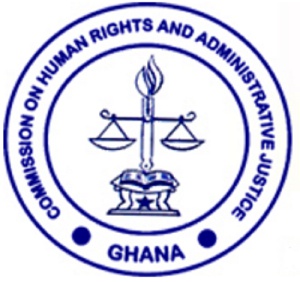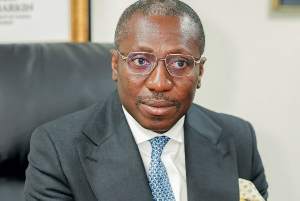Ghana's economic crisis has gotten worse as a result of the Commission on Human Rights and Administrative Justice's (CHRAJ) inefficiency and lack of commitment to finding suitable punishable measures to deal with corrupt politicians in Ghana.
This has also made life more difficult for the poorer members of society. The CHRAJ has betrayed the country, and in my opinion, it should be disbanded until all corrupt Ghanaian politicians and journalists are put behind bars.
For Ghana to advance and its people to prosper, things must change.
If precautions are not taken, Ghana's resources, including its gold, diamonds, cocoa, and oil, will be worthless in five years due to the effects of corruption, money laundering, a decline in foreign investment, and a lack of effective measures to combat corruption in the country. According to estimates, corruption costs Africa $148 billion annually.
With such a sizable deposit of mineral resources, Ghana should have been a great industrialized country capable of meeting the needs of its citizens, similar to former Libya. Unfortunately, the absence of effective measures to combat corruption in the country has caused embezzlement and the misappropriation of funds to significantly increase, leaving the most vulnerable people as unrelenting victims. There hasn't been an administration in Ghana that has kept its word to fight corruption.
Every leader has failed, but the shocking one is the NPP administration currently in power. Due to their numerous alluring promises that eventually turned out to be scams, no one ever imagined that this particular government could be more corrupt and the worst in Ghana's political history.
Akufo Addo has plunged Ghana into an abyss, causing the most extreme suffering for which the people are unprepared. In reality, Ghana confronts more difficult and significant issues in the future.
The Commission on Human Rights and Administrative Justice, or CHRAC, has let Ghana down because they are aware that corruption is the primary cause of the country's issues, which include a high unemployment rate, crime, an economic crisis, and the devaluation of the cedi.
A group of this kind ought to have pushed for tough actions, such as the imprisonment of public officials and elected officials facing allegations of bribery in the state, but they have not done so.
Yesterday, CHRAJ was in the media once more, this time urging the removal of the death sentence from Ghana's criminal justice system. What will this fight bring to Ghana, a country where the Supreme Court already demonstrates blatant corruption, which has caused crime to spread throughout the whole country?
Ghanaians are anticipating CHRAJ to announce measures to bring corrupt Ghanaian politicians to justice to lessen this ongoing issue that has been affecting vulnerable people for a very long time.
If CHRAJ is a genuine group, several people should have resigned or been sent to prison by now. Kwasi Anin-Yeboah, Charles Bissue, Eugene Arhin, Paul Adom-Ochere, and several other people shouldn't work in any Ghanaian institution, to name a few. Their presence in Ghana reflects poorly on the country and its authorities.
One of the reasons African leaders are the least respected in the world is that they ignore issues that have a significant negative impact on their countries out of selfishness.
I will tell you the truth even if it is difficult for Ghanaian politicians or writers to inform Ghanaians that it may take precisely five or more years for Ghana's terrible economic problem to be resolved. Since power belongs to the people, this specific party in power is unable to tell Ghanaians the truth because they want to protect the party and their jobs. However, they are not the ones who can keep their jobs while allowing the poor and the vulnerable to suffer.
Ghana cannot claim to be a democratic nation if it does not imprison its corrupt politicians, as the United States of America and other developing democratic nations in Africa do. Corruption crime has decreased in America because there are many corrupt politicians behind bars, but it has increased in Ghana because it has become institutionalized and the government doesn't care to stop it from happening while they continue to serve the populace and falsely preach daily about the success of the country.
Anywhere you look, even in the United States of America, you can find crooked judges. As you hear about corrupt judges and others abusing highly trusted positions of authority, you should prepare yourself for shock. However, unlike the government of Ghana, which allows them to do so with impunity, the United States government does not give them the freedom to ruin the country.
Corrupt judges are expelled from the judiciary in the United States; one day, Ghana's populace power may enable this to occur and corrupt judges destroying the nation will chase out of the Supreme Court.
In several of my articles, I have stated that no Ghanaian should ever waste their vote for the NPP administration if Paul Adom-Octhere, Eugene Arhin, and other corrupt officials are not brought to justice. It is the responsibility of CHRAJ to see that happen in Ghana, but because they might also be corrupt, they struggle to make wiser choices that will improve Ghana for its people and the next generation. Why should a bucket full of holes be used to fetch water without being fixed?
The serious problem facing Ghana would be worse than what is currently occurring if an effective judicial system is not established to put corrupt politicians there in jail. The country will continue to face severe chronic challenges, a high unemployment rate, criminality, and the fear of starvation despite the abundance of its resources. Additionally, debt will rise, which will further exacerbate the already dire economic situation.
Opinions of Sunday, 27 November 2022
Columnist: Joel Savage















